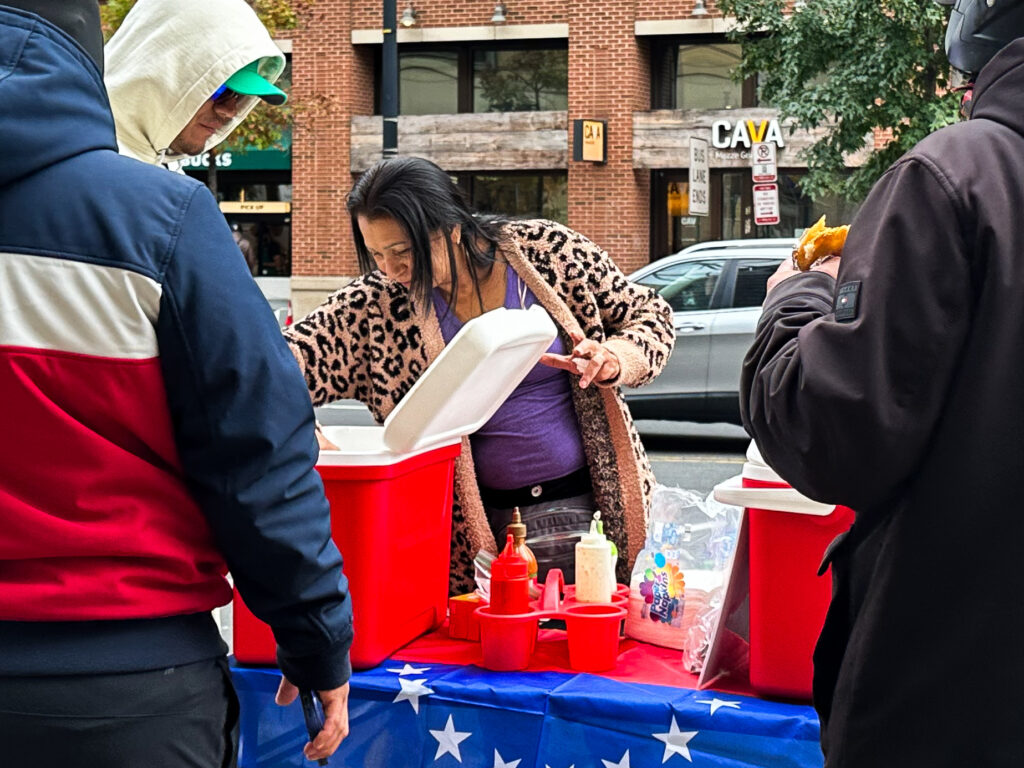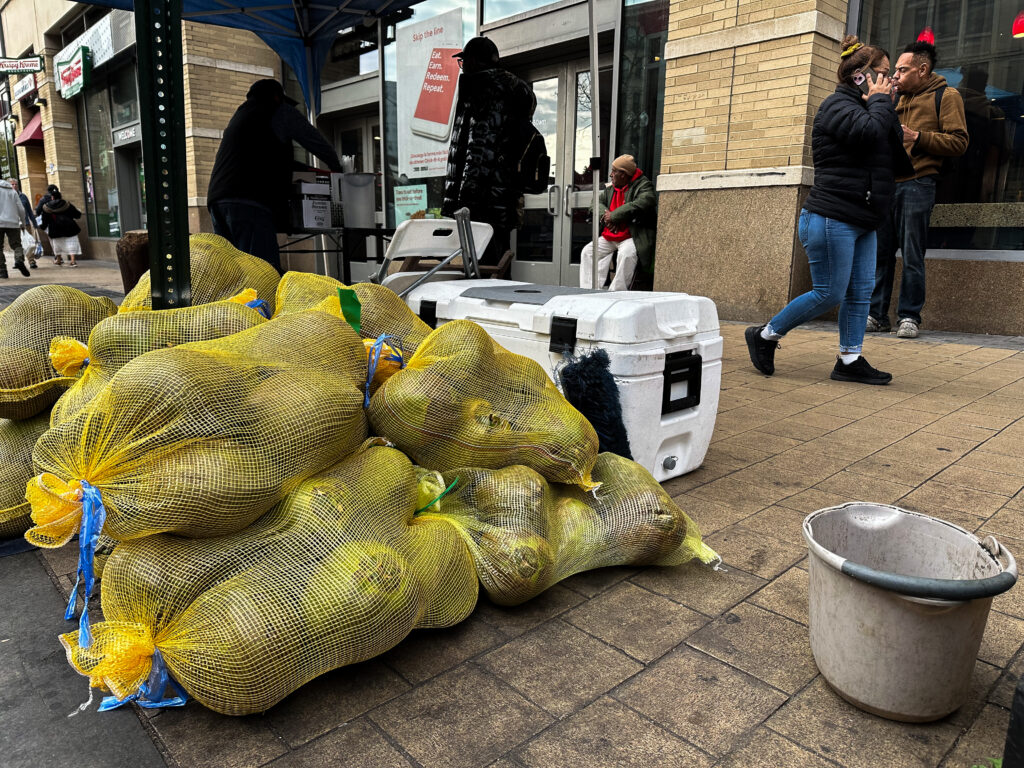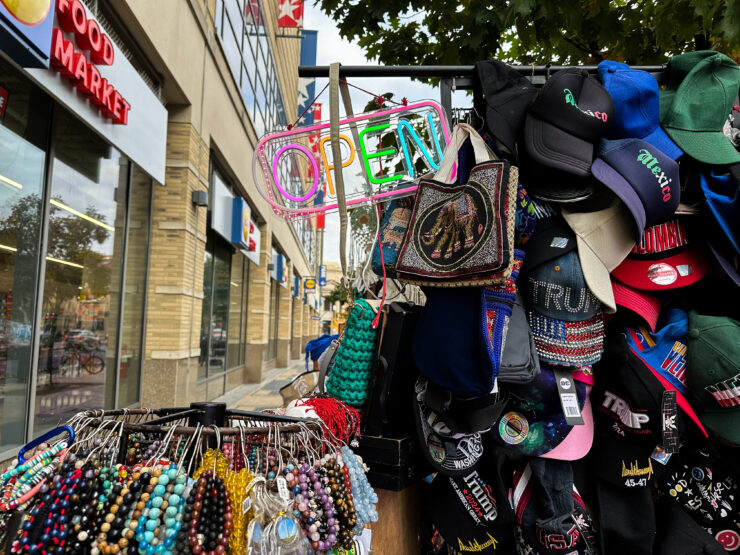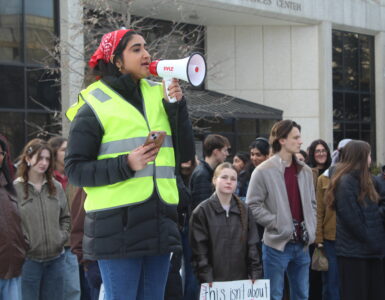The smell of fresh fruit among the crowded street of customers is hard to avoid. Street vending in Columbia Heights and Mount Pleasant has been the heart of its neighborhood for decades. But why is preserving its long history getting complicated?
When you jump off the Columbia Heights Metro station you’re automatically thrown into a congested corner where vendors overcrowd the streets.
Politicians want vending, customers don’t want to see it go away and vendors don’t want to lose their jobs, but to preserve street selling, some people have to move.
In an October Advisory Neighborhood Commission meeting, District Bridges, a nonprofit organization that invests and supports local businesses, informed the council of its status for a new vending zone site plan.
The nonprofit received a grant from the Department of Licensing and Consumer Protection (DLCP) to develop a vending zone project to “create a safe, vibrant space for the area,” Carolina Buitrago, director of programming at District Bridges, said.
Existing problems with the vending system include lack of communication and trust from vendors, sidewalk obstruction, threat of arrest and debt for vendors.
With numerous vendor concerns on the line, the priority for the vending zone manager, District Bridges, has to develop and get approval for 54 vending sites around the Columbia Heights and Mount Pleasant neighborhoods.
Establishing zoning is the first phase of the Street Vendor Advancement Amendment Act of 2023, which began this fiscal year and softened many restrictions around street vending.
It’s a plan that sounds vaguely promising to some, but the vending map still requires approval from the District Department of Transportation (DDOT) and the Department of Licensing and Consumer Protection; however, approval doesn’t seem near, and the zoning manager isn’t clear on what’s next, ANC members said.
Jeremy Sherman, ANC commissioner for 1A04 and committee chair for Small Business and Economic Development, said it’s important to continue vending in the neighborhood as it creates job opportunities and entrepreneur opportunities for small businesses, but the way vending zones currently operate isn’t sustainable long term.
“There’s not enough space on the sidewalk where the street vendors operate, [especially] for someone in a wheelchair, someone with a cane, a family with little kids walking to get by,” Sherman said. “We need a structure to create specific designated sites where vendors can and cannot operate.”

Currently, almost all of the vendors operate on one block, 14th Street. Longtime residents like Williams Jordan, who has lived in the Columbia Heights neighborhood since ‘86, enjoy seeing this site, which makes up the neighborhood’s history, but even he agrees there has to be more space for vending.
“The vendor community has a responsibility to give people an opportunity to make a living [from street selling], and the vendors have a responsibility to respect the community that they’re operating in,” Jordan said.
The slow process of implementing zoning sites for vending is becoming an issue for all.
ANC members are growing frustrated, vendors are uncertain of their potential relocation and neighboring residents are complaining the current space for vending is an eyesore.
If the DLCP and DDOT can agree on the proposed vending map, only selected vendors who have been pre-approved by the District Bridges will be relocated to one of their top three zones.
The next phase would ensure vendor licenses, permits and health certifications compliance.
According to the District Bridges plan, people could vend in Mount Pleasant Street Park, 14th Street and Monroe Street, Lamont Street, Kenyon Street, Columbia Heights Civic Plaza, Irving Street and 16th Street.

Street vending has a long history in the D.C. region, specifically in the Columbia Heights and Mount Pleasant areas. This neighborhood is historically known for vending by Black, Latin and Indigenous workers.
In 2022, The Wash reported the D.C. council’s consideration for two bills, introduced by Ward 1 Councilmember Brianne K. Nadeau, that would decriminalize street vending, set up zones in Columbia Heights, and create two types of licenses, an individual and a vending zone manager license.
In April 2023, the D.C. Council unanimously voted to pass the Street Vendor Advancement Amendment Act.
Sherman said the future of vending doesn’t seem to be going anywhere, but it does require an updated plan.
According to District Bridges, the vending plan will operate a pilot project to determine if the site plan has potential success.
“We’re welcoming feedback, and we’re going to test it out if something is not working we’re going to make readjustments … if we need to move the sites we can discuss it with DLCP and make the changes on the permit and the site plan,” Buitrago said.
There is no required date of when the phase must begin at this time.















Has to go away from Columbua Heughts where stolen goods are sold. I can’t get thru the street walking and feel unsafe. Try to avoid going to the area as much as possible.
“Street vending in Columbia Heights and Mount Pleasant has been the heart of its neighborhood for decades.” This is simply false. I’ve been in this neighborhood for almost 15 years and we went from having one or two vendors in the entire neighborhood, no more than anywhere else, to a complete free-for-all when council decriminalized street vending. This is about circumventing regulations for some at the expense of everyone. The quality of our streetscape has suffered – as a result, brick and mortar businesses have suffered, ultimately the neighborhood is rapidly losing it’s appeal as our councilmember sits on her hands and takes no concrete action to solve the problems created by the lawlessness that has been allowed to proliferate on 14th street.